Principles of Management: Rewards, Motivation, and Nestle Analysis
VerifiedAdded on 2021/09/30
|6
|1436
|147
Essay
AI Summary
This essay delves into the critical aspects of rewards and motivation within the realm of management. It begins by differentiating between traditional and non-traditional rewards, highlighting their impact on employee satisfaction and performance. The essay then explores prominent motivational theories, including Maslow's hierarchy of needs and Herzberg's two-factor theory, illustrating how these frameworks can be applied to design effective reward systems. Furthermore, the paper provides an organizational evaluation of Nestle, analyzing its approach to employee rewards and its alignment with the discussed motivational theories. The conclusion emphasizes the importance of rewards in fostering employee engagement and achieving organizational goals. The essay uses references to support the claims made.
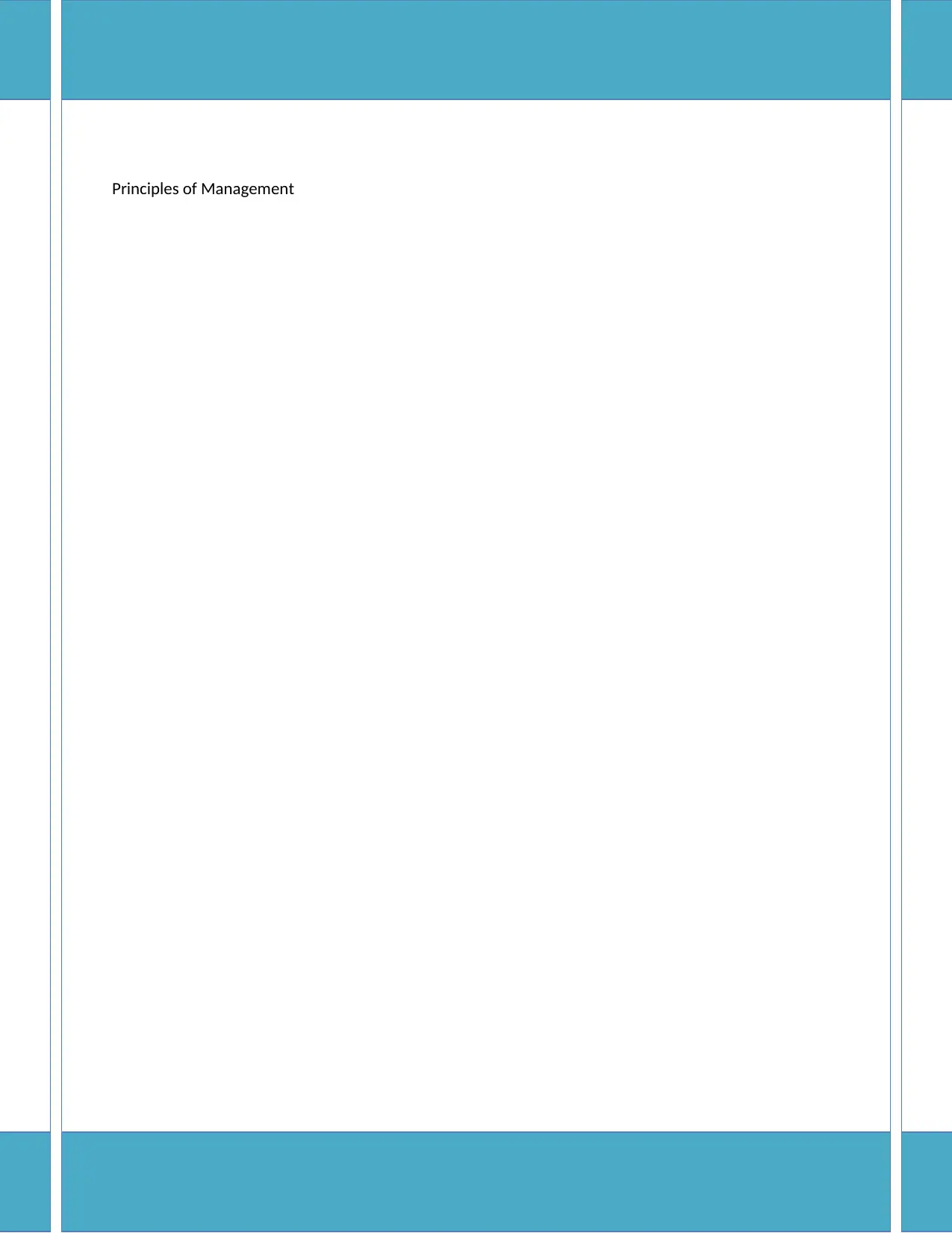
Principles of Management
Paraphrase This Document
Need a fresh take? Get an instant paraphrase of this document with our AI Paraphraser
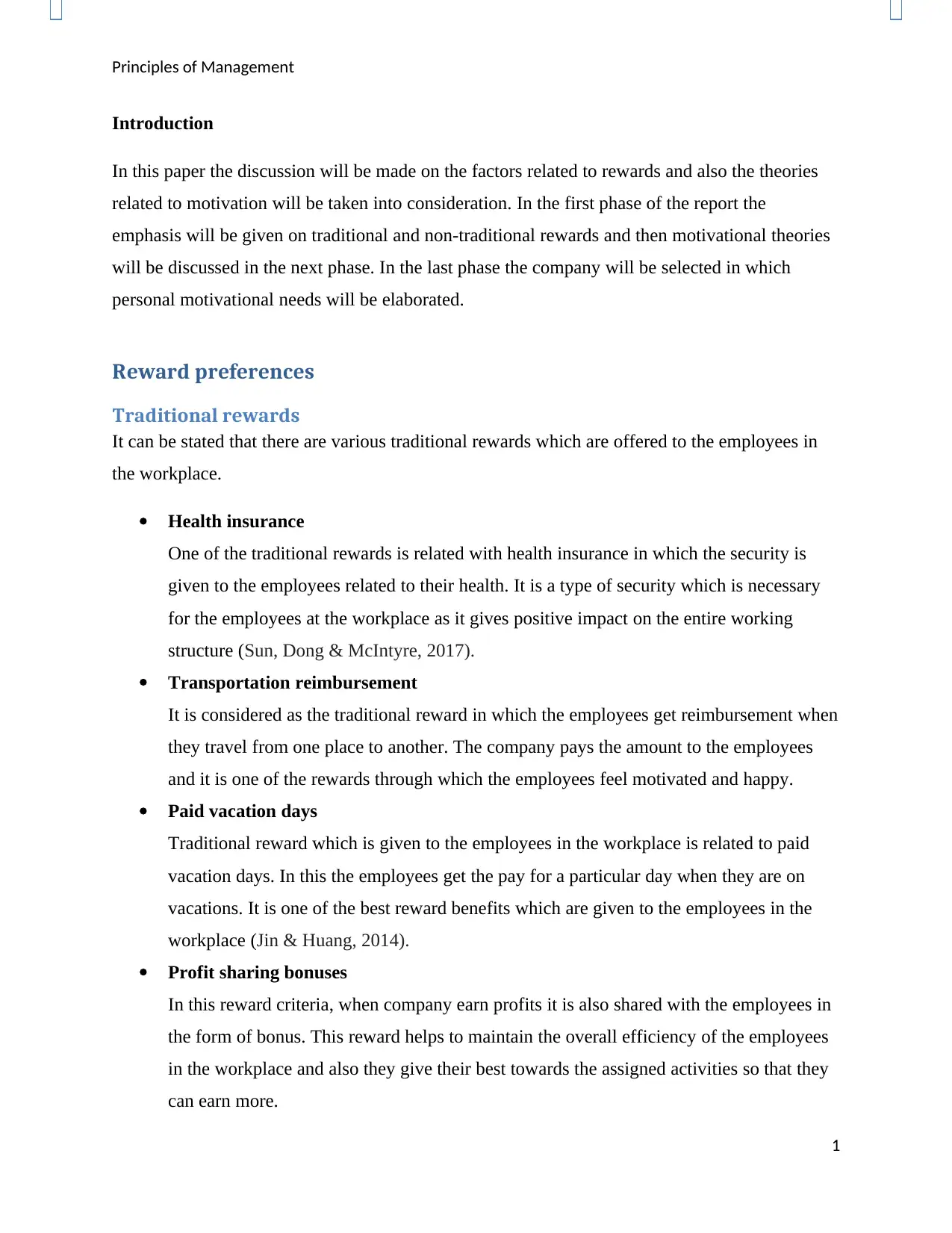
Principles of Management
Introduction
In this paper the discussion will be made on the factors related to rewards and also the theories
related to motivation will be taken into consideration. In the first phase of the report the
emphasis will be given on traditional and non-traditional rewards and then motivational theories
will be discussed in the next phase. In the last phase the company will be selected in which
personal motivational needs will be elaborated.
Reward preferences
Traditional rewards
It can be stated that there are various traditional rewards which are offered to the employees in
the workplace.
Health insurance
One of the traditional rewards is related with health insurance in which the security is
given to the employees related to their health. It is a type of security which is necessary
for the employees at the workplace as it gives positive impact on the entire working
structure (Sun, Dong & McIntyre, 2017).
Transportation reimbursement
It is considered as the traditional reward in which the employees get reimbursement when
they travel from one place to another. The company pays the amount to the employees
and it is one of the rewards through which the employees feel motivated and happy.
Paid vacation days
Traditional reward which is given to the employees in the workplace is related to paid
vacation days. In this the employees get the pay for a particular day when they are on
vacations. It is one of the best reward benefits which are given to the employees in the
workplace (Jin & Huang, 2014).
Profit sharing bonuses
In this reward criteria, when company earn profits it is also shared with the employees in
the form of bonus. This reward helps to maintain the overall efficiency of the employees
in the workplace and also they give their best towards the assigned activities so that they
can earn more.
1
Introduction
In this paper the discussion will be made on the factors related to rewards and also the theories
related to motivation will be taken into consideration. In the first phase of the report the
emphasis will be given on traditional and non-traditional rewards and then motivational theories
will be discussed in the next phase. In the last phase the company will be selected in which
personal motivational needs will be elaborated.
Reward preferences
Traditional rewards
It can be stated that there are various traditional rewards which are offered to the employees in
the workplace.
Health insurance
One of the traditional rewards is related with health insurance in which the security is
given to the employees related to their health. It is a type of security which is necessary
for the employees at the workplace as it gives positive impact on the entire working
structure (Sun, Dong & McIntyre, 2017).
Transportation reimbursement
It is considered as the traditional reward in which the employees get reimbursement when
they travel from one place to another. The company pays the amount to the employees
and it is one of the rewards through which the employees feel motivated and happy.
Paid vacation days
Traditional reward which is given to the employees in the workplace is related to paid
vacation days. In this the employees get the pay for a particular day when they are on
vacations. It is one of the best reward benefits which are given to the employees in the
workplace (Jin & Huang, 2014).
Profit sharing bonuses
In this reward criteria, when company earn profits it is also shared with the employees in
the form of bonus. This reward helps to maintain the overall efficiency of the employees
in the workplace and also they give their best towards the assigned activities so that they
can earn more.
1
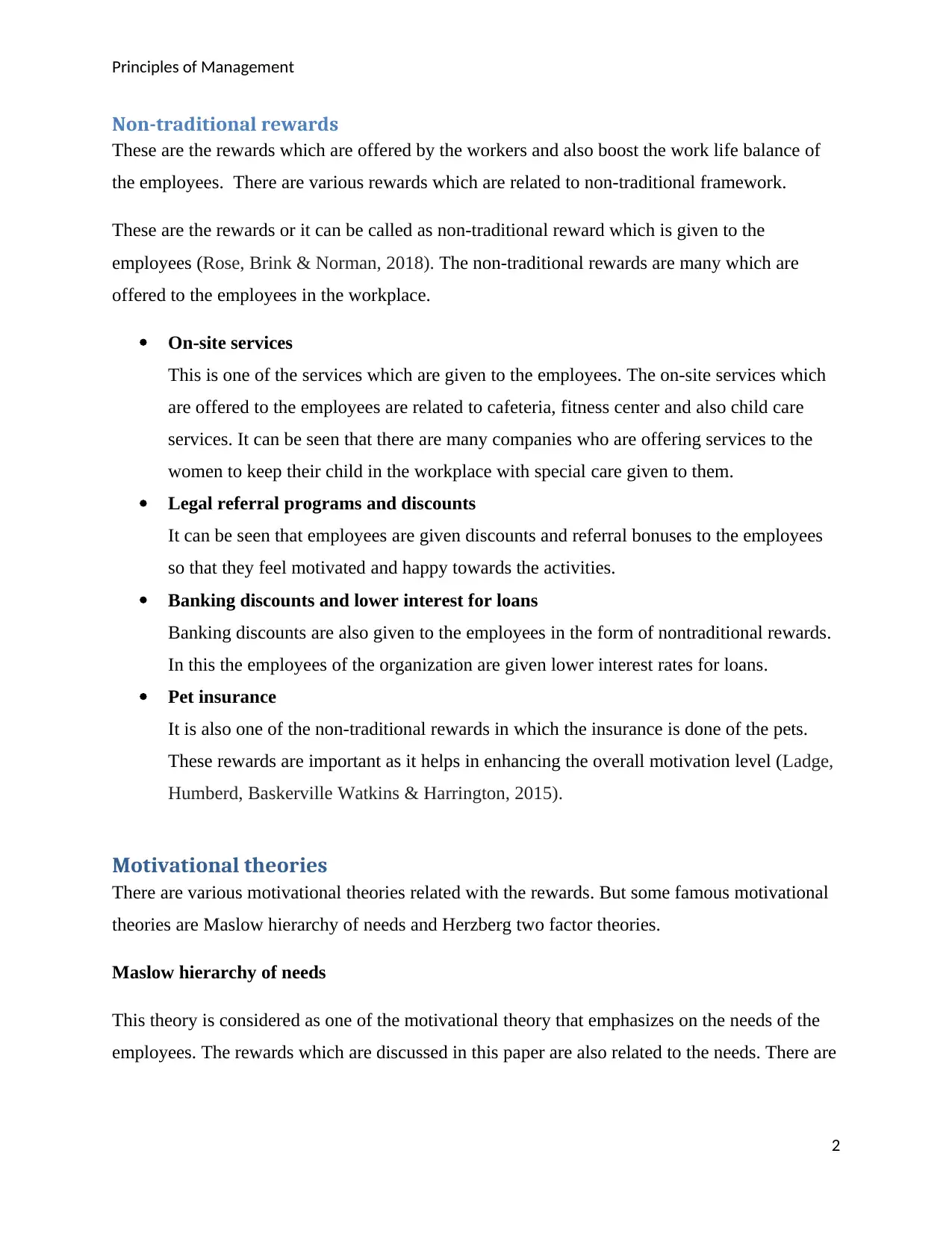
Principles of Management
Non-traditional rewards
These are the rewards which are offered by the workers and also boost the work life balance of
the employees. There are various rewards which are related to non-traditional framework.
These are the rewards or it can be called as non-traditional reward which is given to the
employees (Rose, Brink & Norman, 2018). The non-traditional rewards are many which are
offered to the employees in the workplace.
On-site services
This is one of the services which are given to the employees. The on-site services which
are offered to the employees are related to cafeteria, fitness center and also child care
services. It can be seen that there are many companies who are offering services to the
women to keep their child in the workplace with special care given to them.
Legal referral programs and discounts
It can be seen that employees are given discounts and referral bonuses to the employees
so that they feel motivated and happy towards the activities.
Banking discounts and lower interest for loans
Banking discounts are also given to the employees in the form of nontraditional rewards.
In this the employees of the organization are given lower interest rates for loans.
Pet insurance
It is also one of the non-traditional rewards in which the insurance is done of the pets.
These rewards are important as it helps in enhancing the overall motivation level (Ladge,
Humberd, Baskerville Watkins & Harrington, 2015).
Motivational theories
There are various motivational theories related with the rewards. But some famous motivational
theories are Maslow hierarchy of needs and Herzberg two factor theories.
Maslow hierarchy of needs
This theory is considered as one of the motivational theory that emphasizes on the needs of the
employees. The rewards which are discussed in this paper are also related to the needs. There are
2
Non-traditional rewards
These are the rewards which are offered by the workers and also boost the work life balance of
the employees. There are various rewards which are related to non-traditional framework.
These are the rewards or it can be called as non-traditional reward which is given to the
employees (Rose, Brink & Norman, 2018). The non-traditional rewards are many which are
offered to the employees in the workplace.
On-site services
This is one of the services which are given to the employees. The on-site services which
are offered to the employees are related to cafeteria, fitness center and also child care
services. It can be seen that there are many companies who are offering services to the
women to keep their child in the workplace with special care given to them.
Legal referral programs and discounts
It can be seen that employees are given discounts and referral bonuses to the employees
so that they feel motivated and happy towards the activities.
Banking discounts and lower interest for loans
Banking discounts are also given to the employees in the form of nontraditional rewards.
In this the employees of the organization are given lower interest rates for loans.
Pet insurance
It is also one of the non-traditional rewards in which the insurance is done of the pets.
These rewards are important as it helps in enhancing the overall motivation level (Ladge,
Humberd, Baskerville Watkins & Harrington, 2015).
Motivational theories
There are various motivational theories related with the rewards. But some famous motivational
theories are Maslow hierarchy of needs and Herzberg two factor theories.
Maslow hierarchy of needs
This theory is considered as one of the motivational theory that emphasizes on the needs of the
employees. The rewards which are discussed in this paper are also related to the needs. There are
2
⊘ This is a preview!⊘
Do you want full access?
Subscribe today to unlock all pages.

Trusted by 1+ million students worldwide
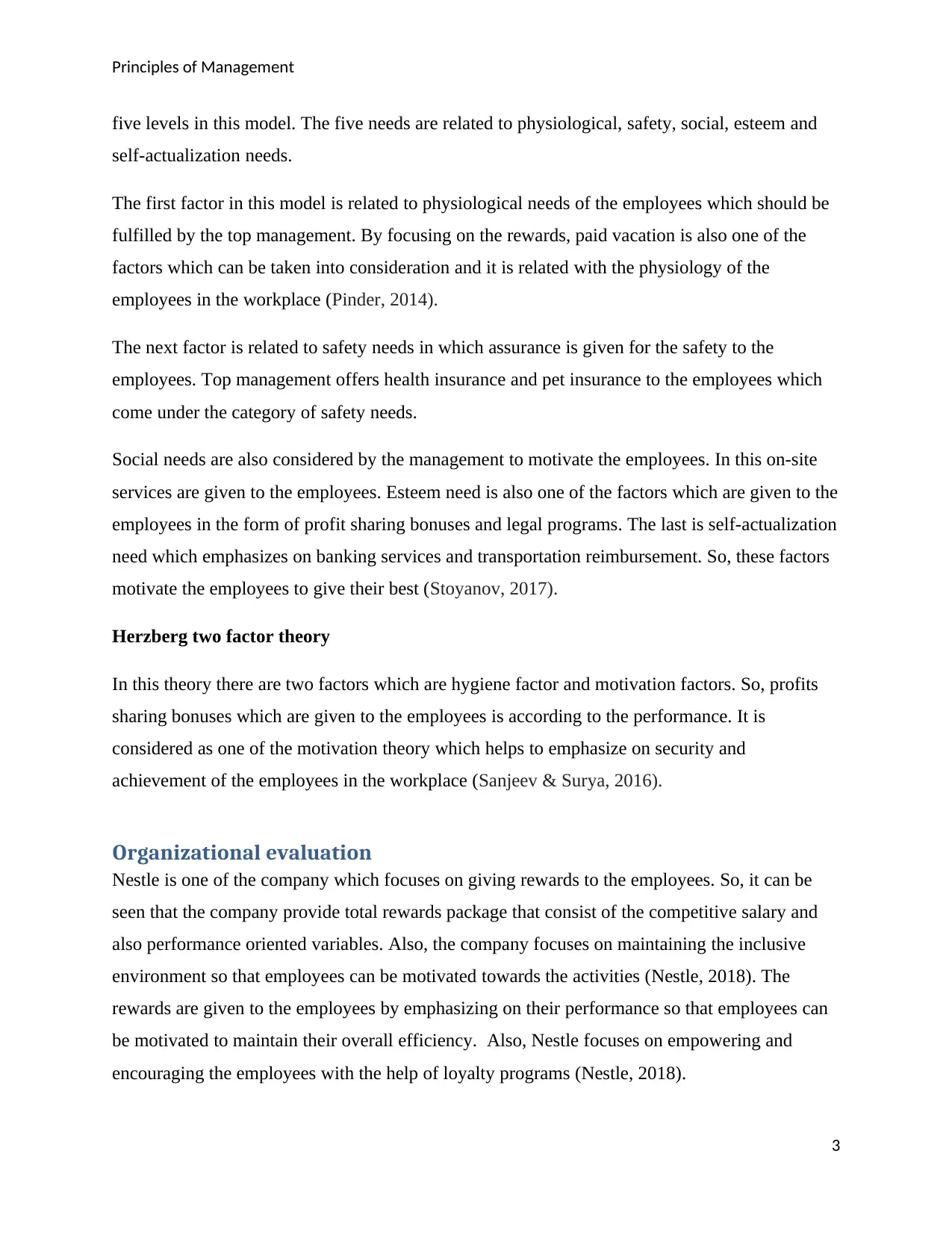
Principles of Management
five levels in this model. The five needs are related to physiological, safety, social, esteem and
self-actualization needs.
The first factor in this model is related to physiological needs of the employees which should be
fulfilled by the top management. By focusing on the rewards, paid vacation is also one of the
factors which can be taken into consideration and it is related with the physiology of the
employees in the workplace (Pinder, 2014).
The next factor is related to safety needs in which assurance is given for the safety to the
employees. Top management offers health insurance and pet insurance to the employees which
come under the category of safety needs.
Social needs are also considered by the management to motivate the employees. In this on-site
services are given to the employees. Esteem need is also one of the factors which are given to the
employees in the form of profit sharing bonuses and legal programs. The last is self-actualization
need which emphasizes on banking services and transportation reimbursement. So, these factors
motivate the employees to give their best (Stoyanov, 2017).
Herzberg two factor theory
In this theory there are two factors which are hygiene factor and motivation factors. So, profits
sharing bonuses which are given to the employees is according to the performance. It is
considered as one of the motivation theory which helps to emphasize on security and
achievement of the employees in the workplace (Sanjeev & Surya, 2016).
Organizational evaluation
Nestle is one of the company which focuses on giving rewards to the employees. So, it can be
seen that the company provide total rewards package that consist of the competitive salary and
also performance oriented variables. Also, the company focuses on maintaining the inclusive
environment so that employees can be motivated towards the activities (Nestle, 2018). The
rewards are given to the employees by emphasizing on their performance so that employees can
be motivated to maintain their overall efficiency. Also, Nestle focuses on empowering and
encouraging the employees with the help of loyalty programs (Nestle, 2018).
3
five levels in this model. The five needs are related to physiological, safety, social, esteem and
self-actualization needs.
The first factor in this model is related to physiological needs of the employees which should be
fulfilled by the top management. By focusing on the rewards, paid vacation is also one of the
factors which can be taken into consideration and it is related with the physiology of the
employees in the workplace (Pinder, 2014).
The next factor is related to safety needs in which assurance is given for the safety to the
employees. Top management offers health insurance and pet insurance to the employees which
come under the category of safety needs.
Social needs are also considered by the management to motivate the employees. In this on-site
services are given to the employees. Esteem need is also one of the factors which are given to the
employees in the form of profit sharing bonuses and legal programs. The last is self-actualization
need which emphasizes on banking services and transportation reimbursement. So, these factors
motivate the employees to give their best (Stoyanov, 2017).
Herzberg two factor theory
In this theory there are two factors which are hygiene factor and motivation factors. So, profits
sharing bonuses which are given to the employees is according to the performance. It is
considered as one of the motivation theory which helps to emphasize on security and
achievement of the employees in the workplace (Sanjeev & Surya, 2016).
Organizational evaluation
Nestle is one of the company which focuses on giving rewards to the employees. So, it can be
seen that the company provide total rewards package that consist of the competitive salary and
also performance oriented variables. Also, the company focuses on maintaining the inclusive
environment so that employees can be motivated towards the activities (Nestle, 2018). The
rewards are given to the employees by emphasizing on their performance so that employees can
be motivated to maintain their overall efficiency. Also, Nestle focuses on empowering and
encouraging the employees with the help of loyalty programs (Nestle, 2018).
3
Paraphrase This Document
Need a fresh take? Get an instant paraphrase of this document with our AI Paraphraser
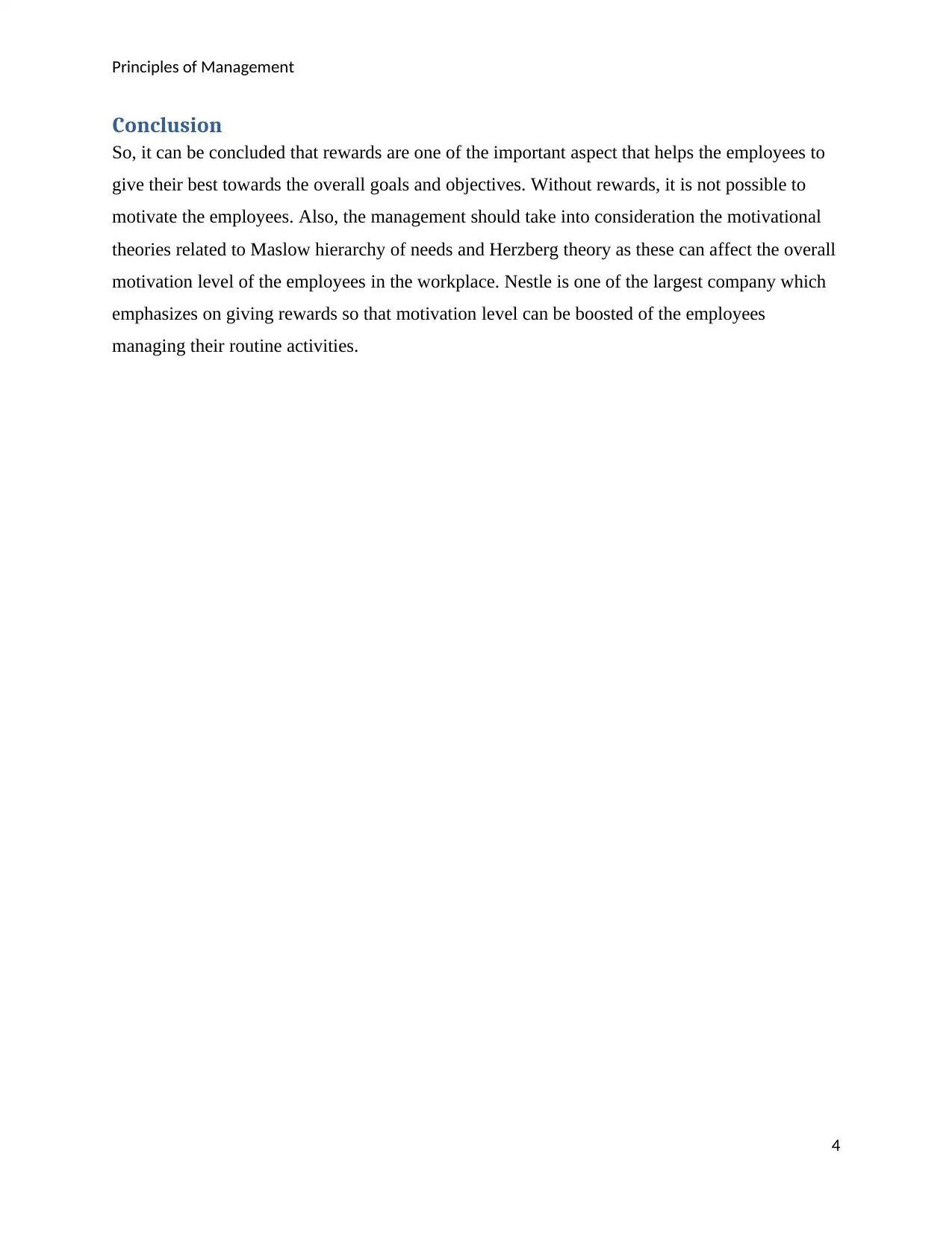
Principles of Management
Conclusion
So, it can be concluded that rewards are one of the important aspect that helps the employees to
give their best towards the overall goals and objectives. Without rewards, it is not possible to
motivate the employees. Also, the management should take into consideration the motivational
theories related to Maslow hierarchy of needs and Herzberg theory as these can affect the overall
motivation level of the employees in the workplace. Nestle is one of the largest company which
emphasizes on giving rewards so that motivation level can be boosted of the employees
managing their routine activities.
4
Conclusion
So, it can be concluded that rewards are one of the important aspect that helps the employees to
give their best towards the overall goals and objectives. Without rewards, it is not possible to
motivate the employees. Also, the management should take into consideration the motivational
theories related to Maslow hierarchy of needs and Herzberg theory as these can affect the overall
motivation level of the employees in the workplace. Nestle is one of the largest company which
emphasizes on giving rewards so that motivation level can be boosted of the employees
managing their routine activities.
4
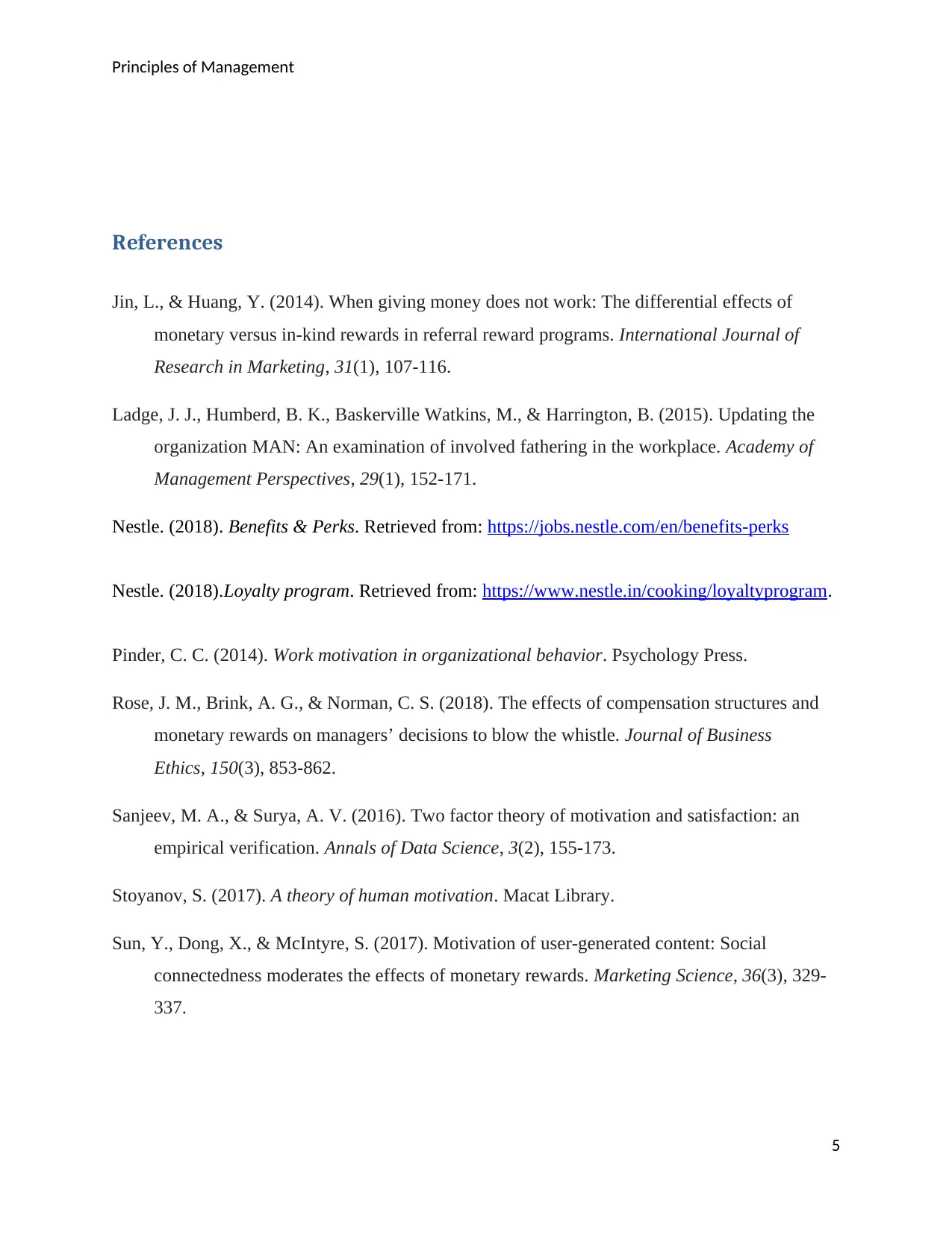
Principles of Management
References
Jin, L., & Huang, Y. (2014). When giving money does not work: The differential effects of
monetary versus in-kind rewards in referral reward programs. International Journal of
Research in Marketing, 31(1), 107-116.
Ladge, J. J., Humberd, B. K., Baskerville Watkins, M., & Harrington, B. (2015). Updating the
organization MAN: An examination of involved fathering in the workplace. Academy of
Management Perspectives, 29(1), 152-171.
Nestle. (2018). Benefits & Perks. Retrieved from: https://jobs.nestle.com/en/benefits-perks
Nestle. (2018).Loyalty program. Retrieved from: https://www.nestle.in/cooking/loyaltyprogram.
Pinder, C. C. (2014). Work motivation in organizational behavior. Psychology Press.
Rose, J. M., Brink, A. G., & Norman, C. S. (2018). The effects of compensation structures and
monetary rewards on managers’ decisions to blow the whistle. Journal of Business
Ethics, 150(3), 853-862.
Sanjeev, M. A., & Surya, A. V. (2016). Two factor theory of motivation and satisfaction: an
empirical verification. Annals of Data Science, 3(2), 155-173.
Stoyanov, S. (2017). A theory of human motivation. Macat Library.
Sun, Y., Dong, X., & McIntyre, S. (2017). Motivation of user-generated content: Social
connectedness moderates the effects of monetary rewards. Marketing Science, 36(3), 329-
337.
5
References
Jin, L., & Huang, Y. (2014). When giving money does not work: The differential effects of
monetary versus in-kind rewards in referral reward programs. International Journal of
Research in Marketing, 31(1), 107-116.
Ladge, J. J., Humberd, B. K., Baskerville Watkins, M., & Harrington, B. (2015). Updating the
organization MAN: An examination of involved fathering in the workplace. Academy of
Management Perspectives, 29(1), 152-171.
Nestle. (2018). Benefits & Perks. Retrieved from: https://jobs.nestle.com/en/benefits-perks
Nestle. (2018).Loyalty program. Retrieved from: https://www.nestle.in/cooking/loyaltyprogram.
Pinder, C. C. (2014). Work motivation in organizational behavior. Psychology Press.
Rose, J. M., Brink, A. G., & Norman, C. S. (2018). The effects of compensation structures and
monetary rewards on managers’ decisions to blow the whistle. Journal of Business
Ethics, 150(3), 853-862.
Sanjeev, M. A., & Surya, A. V. (2016). Two factor theory of motivation and satisfaction: an
empirical verification. Annals of Data Science, 3(2), 155-173.
Stoyanov, S. (2017). A theory of human motivation. Macat Library.
Sun, Y., Dong, X., & McIntyre, S. (2017). Motivation of user-generated content: Social
connectedness moderates the effects of monetary rewards. Marketing Science, 36(3), 329-
337.
5
⊘ This is a preview!⊘
Do you want full access?
Subscribe today to unlock all pages.

Trusted by 1+ million students worldwide
1 out of 6
Related Documents
Your All-in-One AI-Powered Toolkit for Academic Success.
+13062052269
info@desklib.com
Available 24*7 on WhatsApp / Email
![[object Object]](/_next/static/media/star-bottom.7253800d.svg)
Unlock your academic potential
Copyright © 2020–2026 A2Z Services. All Rights Reserved. Developed and managed by ZUCOL.





